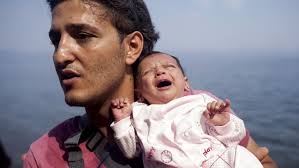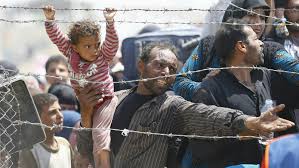
Throughout our lives we make and act on calculated risks. Every day that we wake up, get in the shower, climb in a car, walk down the street, or do nearly anything we are taking risks. Everything comes with a risk quotient. That is, we choose to act knowing there is the chance of harm, and at worst, knowing there is a chance we could be killed. People fall in the shower. Car accidents happen. Walking down the street brings falling pianos, out-of-control drivers, and–in the U.S.–people with guns. We continue to do these things anyway.
We do the same with our family and friends. We allow them to take risks, and we worry and hope for the best. And we know that life wouldn’t be normal, wouldn’t be enjoyable, meaningful, purposeful, or worth living if we didn’t take these risks. And because of the meaning that these acts bring to our lives, we seldom give the risks involved a second thought. Why should we?
We also make calculated risks knowing that being harmed is a real possibility, because to do otherwise—to not take the risk—would make it impossible for us to be the type of people we want to be. To do otherwise, is not who we are.
These risks with known possible harm have little directly to do with our daily activities, but everything to do with our moral well-being and what we see as our obligations to others. We could say that these risks are defining of who we are as human beings. For those of us who claim to be Christians, our acts in the face of possible harm are framed as being a Good Samaritan (Luke 10:33), or as doing unto others as you would have others do unto or or as loving thy neighbor. These ways of being in the world come packed with the power of faith, spirituality, and love, and are rationalized and verbalized to suggest we should expect nothing less of ourselves. We can expect nothing less of ourselves if we are who we say we are.
So when we stop to help a stranded motorist, talk to strangers who are lost, break up a fight on the bus, help someone who has just been robbed, or run into a burning building, we take calculated risks and are conscious of those risks. We do so as if to say to the world that “the harm that can be done to me can never outweigh my obligations to others. That is just who I am.”
So, knowing this, and knowing the the President has turned his back on those people in the world who may be in most need of our help, I wonder how our response to his actions can be any different than what it would be in the myriad other situations–both mundane and significant–where we proclaim ourselves to be righteous and moral people. I BELIEVE THAT OUR OBLIGATIONS TO REFUGEES–TO ANY HUMAN BEING UNDER THREAT–ARE THE SAME AND COULD NEVER, UNDER ANY CIRCUMSTANCES, BE ANY DIFFERENT. IT IS DEMANDED OF US THAT WE ALWAYS REJECT AND STAND AGAINST THE PRESIDENT’S HATRED BECAUSE NOT TO DO SO IS NOT WHO WE PROCLAIM OURSELVES TO BE.
Yes, being decent, caring, moral people requires we take risks. The fact is, in the case of refugees, those risks are minuscule, even less than the risk of falling in the shower and dying. Anyone who suggests otherwise and uses those beliefs to reject others holds some responsibility for the damage that the President’s actions will have.
Still, there will always be a risk quotient, and there will always be the possibility of harm coming to us, our family, our friends whether the person we welcome among us is a fellow citizen, an immigrant, or a refugee. Just know and never forget, the risks are always minuscule, and probably less than most of the things you do every day. WE MUST CHOOSE TO TAKE THESE RISKS NOT BECAUSE WE DON’T KNOW THEY EXIST OR THAT WE ARE NAIVE BUT BECAUSE WE KNOW THAT THE OPTION NOT TO CHOOSE TO TAKE THEM IS AN ABOMINATION OF WHO WE ARE. BY NOT RESPONDING RIGHTEOUSLY AND MORALLY, WE PLACE OURSELVES AT A GREATER, FAR MORE DANGEROUS RISK. THAT IS, WE PLACE OURSELVES AT THE RISK THAT COMES WITH DENYING OTHERS AND OURSELVES OUR HUMANITY. THAT IS A RISK THAT WE SHOULD ALWAYS REJECT.

